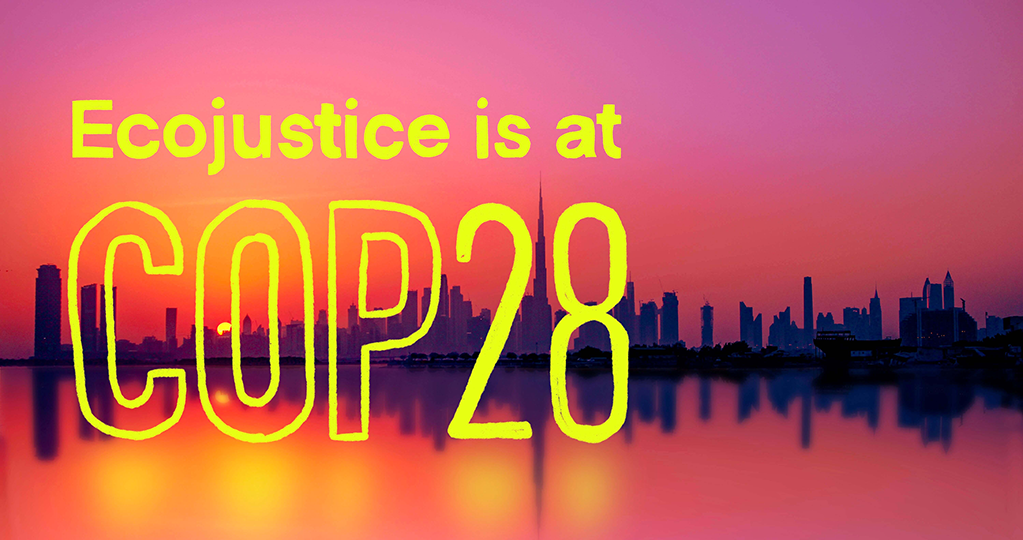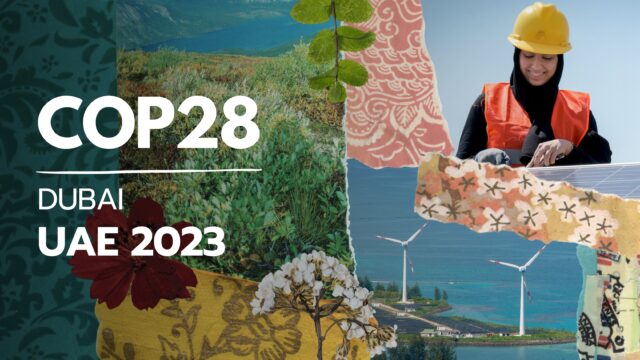This week, I’m travelling to Dubai along with my colleague Melanie Snow to attend the 28th Conference of the Parties to the United Nations Framework Convention on Climate Change. It is the UN’s annual summit to coordinate climate action, otherwise known as COP28.
The stakes could not be higher after a year in which the deadly reality of climate change became undeniable as record wildfires, heatwaves and floods swept Canada and the rest of the world.
The next two weeks will be a crucial moment for global climate action. It will also be an opportunity for Canada to show climate leadership on the world stage.
What is COP28?
The 28th Conference of the Parties, also known as COP28, is a moment when all countries —including Canada — will review their progress in fulfilling their climate commitments and chart a course forward.
This will be the conclusion of the first “global stocktake” since the landmark Paris Agreement in 2015. That year, Canada joined 195 other nations in committing to trying to limit global warming to 1.5 degrees Celsius. The global stocktake adds up each country’s pledges to see whether we are on track to achieve our climate goals. It is already clear that we are way off track, so discussions in Dubai must result in a rapid course correction.
The latest UN report warned that the world has failed to act. 2023 was a record year for both global temperatures and carbon emissions. [1] Unless countries improve their pledges to cut pollution, we are on course for a catastrophic 3-degree Celsius average temperature rise.
There is still a slim chance of keeping global warming to 1.5 degrees Celsius. But it risks disappearing out of sight without a renewed global commitment to slash carbon pollution and the coal, oil and gas that fuels it.
What is Canada doing about climate change?
Canada’s current emissions target falls short of what is needed.
There is a scientific consensus that global emissions must reduce by nearly half by 2030. Canada is currently the worst polluter in the G7 group of wealthy countries by any measure. Its wealth was built on a long history of pumping pollution into the atmosphere.
So, Canada has a responsibility to go further and faster than the global average. This isn’t just a moral obligation, but a legal principle at the heart of the Paris Agreement.
Canada is struggling to meet its current target of a 40-45 per cent reduction by 2030. The federal government’s current plan will not meet that target without major improvements. [2]
The federal government has recently faced some demoralizing setbacks for its environmental agenda. In October, the Supreme Court found that the Impact Assessment Act was unconstitutional. This month, its landmark plastics law was similarly struck down.
Amid interlocking environmental crises, the federal government cannot retreat from its environmental goals.
COP28 is an opportunity for the Canadian government to show the world that it can become a climate leader.
Why is Ecojustice attending COP28?
Ecojustice is attending COP28 because being on the ground in Dubai will give us unparalleled access to Canadian officials and political leaders. It gives us an opportunity to influence climate policy directly — both domestically and internationally.
Our number one goal for COP28 is for Canada to get its climate agenda back on track. [3] We hope to see a new plan and policies that will close the gaps in its climate plan and put that 2030 target within reach. And we want to see Canada commit to ratcheting up its ambition with a new and improved pledge.
The Paris Agreement is Ecojustice’s north star. Our climate team works tirelessly to put Canada on a path to 1.5 degrees Celsius that is based on science and anchored in law.
We worked with the federal government to deliver Canada’s first-ever law that embeds its Paris Agreement commitments. Now, we continue to press for the credible plan that the law demands. We are also in ongoing litigation against the government of Ontario because its climate targets fall well short of any fair share of the 1.5 degree Celsius temperature goal.
The Paris Agreement is an instrument of international law. It is predicated on cooperation and trust between nations. It requires each party to pledge to curb pollution, follow through with real action, and transparently and honestly report on progress. But time and again, western countries, including Canada, have failed to live up to their promises.
Canada is no exception, having missed every climate target it has ever set.
What do we want to see at COP28?
COP28 presents an opportunity for western countries to rebuild trust by reaching a justice-informed agreement to help the global south tackle and adapt to the climate crisis. This means countries like Canada will need to stop the flow of finance to fossil fuels. They must also deliver on their promises to assist countries in the global south as they adapt to climate change and pursue a cleaner pathway to prosperity.
Failing to address the financial forces driving climate chaos directly impacts the lives and livelihoods of everyone in Canada. It also puts people around the world at risk from climate change.
Canada continues to export millions of tonnes of coal each year, including American coal, from its ports. It’s time for the federal government to deliver on its promise to the world and ban the export of thermal coal as soon as possible.
We want to see Canada resume its leadership position on coal. In a positive step, Canada is reported to be one of the countries behind a letter to the COP28 president to end financing for new coal projects.
Ecojustice wants the federal government to show the world it can be a climate leader. This means a plan to meet Canada’s current pledge of a 45 per cent reduction in emissions by 2030, and a new target aligned with the science and Canada’s status as one of the world’s worst polluters.
Ecojustice is going to COP28 to join a global movement to keep the goal of 1.5 degrees Celsius alive. We can help ensure that countries like Canada deliver on their promise to the world to tackle the carbon pollution that is driving climate change.
We’ll be keeping you up to date with everything that is happening on the ground at COP28.
References
[1] Emissions Gap Report — United Nations Environment Programme
[2] 2023 Reports 6 to 10 of the Commissioner of the Environment and Sustainable Development to the Parliament of Canada — Office of the Auditor General of Canada
[3] Hulse and Brouillette: A Climate Carol — will Canada heed the warnings and meet its emissions targets? — Ottawa Citizen



